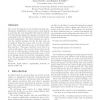Free Online Productivity Tools
i2Speak
i2Symbol
i2OCR
iTex2Img
iWeb2Print
iWeb2Shot
i2Type
iPdf2Split
iPdf2Merge
i2Bopomofo
i2Arabic
i2Style
i2Image
i2PDF
iLatex2Rtf
Sci2ools
120
click to vote
IJNSEC
2007
2007
Integrity of mobile agents: a new approach
The recent developments in the mobile technology (mobile phones, middleware) created a need for new methods of protecting the code transmitted through the network. The oldest and the simplest mechanisms concentrate more on integrity of the code itself and on the detection of unauthorized manipulation. The newer solutions not only secure the compiled program, but also the data, that can be gathered during its journey and even the execution state. Some other approaches base on prevention rather than detection. This paper describes a new idea of securing mobile agents. The presented method protects all: the code, the data and the execution state. The proposal is based on a zero-knowledge proof system and a secure secret sharing scheme, two powerful cryptographic primitives. The paper also includes security analysis of the new method and comparison to currently most widespread solutions.
Related Content
| Added | 15 Dec 2010 |
| Updated | 15 Dec 2010 |
| Type | Journal |
| Year | 2007 |
| Where | IJNSEC |
| Authors | Aneta Zwierko, Zbigniew Kotulski |
Comments (0)

